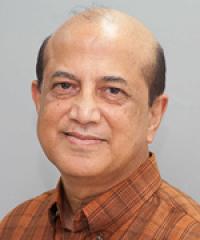
From Dhaka to the World: Two Decades of Advancing Global Health Equity
PopFam 50th Anniversary Impact Series - Q&A with Ahmed Mushtaque Raza Chowdhury
A. Mushtaque Raza Chowdhury, PhD—PopFam clinical professor, implementation expert, former Executive Director of BRAC, and founding dean of the one of the world’s leading schools of public health—first set foot on the Columbia Mailman campus in 2002. Over the two decades since, he has led and supported development and public health work across dozens of countries, stood at the helm of major UN and PopFam programs, and spoken with urgency and clarity on the need to confront inequities with bold, large-scale projects and investment in local health infrastructure. As part of PopFam’s 50th Anniversary and in celebration of international partnerships, Mushtaque reflects on how his time in the Department shaped his global health career—and shares his hopes for the next 50 years.
What drew you to Columbia University Mailman and PopFam Department?
In 2001, the Rockefeller Foundation and Allan Rosenfield, former Dean of the School and PopFam Chair, asked me to lead the development of a new health equity program in PopFam.
Allan and I got close over the next two years, and when BRAC, my organization in Bangladesh, chose me as their next executive director, he agreed to let me stay on in an unsalaried position while I took the job. That was in 2004, and I’ve been a professor in PopFam ever since.
How has your work evolved over the years?
Here’s one example. When I served as co-coordinator of the task force for Millenium Development Goals (MDGs), we concluded that Africa had seen many successful development initiatives, but they were small and isolated. The challenge was in successfully scaling those initiatives.
When I returned to BRAC, I asked them to move to Africa. We started in Uganda, South Sudan, and Tanzania, and now the organization works in 13 countries including eight in Africa.
Tell us about your work as the dean of the BRAC University James P. Grant School of Public Health.
During those two years in New York, I got to see how a reputable school of public health works. When I returned to Dhaka, I served as founding Dean of the of the BRAC School of Public Health, now one of the top schools of public health in the world.
Now we’re celebrating 20 years, and Columbia Mailman and PopFam helped make it happen through advice and faculty support.
How has your work at PopFam helped to shape your work in Bangladesh?
During my time at Columbia, I was able to look at Bangladesh's own health story from the outside. I delivered lectures there, and at John’s Hopkins and other universities, describing Bangladesh’s success on many health indicators, and that led to a series of articles in the Lancet in 2013.
Tell us about the Bangladesh Education Watch and the Bangladesh Health Watch.
The Bangladesh government runs the main programs in health and education, but each have serious problems. Education Watch was our way to help the government stay on track: every year, we publish a report on the state of education.
After our first report, in 1999, the government and many NGOs running education programs started changing the curriculum and their pedagogy to improve the delivery of primary education. Based on that success, we created Health Watch in 2006.
Did your students get involved in these initiatives?
Yes, absolutely. At the BRAC school, students spend quite a significant amount of time in the field. We’re one of very few universities which have been able to do experiential learning well, and it’s because we have access to the BRAC organization providing a field laboratory in almost every district and sub-district in Bangladesh.
Tell us about your work in other areas of the world.
When I was Director of research at BRAC, we worked all over — our first expansion outside Bangladesh was to Afghanistan in 2003. And, as part of the Rockefeller Foundation, I was based in Bangkok for years, working with countries in Southeast Asia—Vietnam, Thailand, Cambodia, China, Myanmar, Laos and so on— and developed universal health coverage programs.
Through my research, I visited the 12 poorest Chinese provinces to evaluate a microcredit program in the late ‘90s, where I saw the huge social benefits for women even though the amounts being lent were quite small.
What are the most pressing challenges in public health today?
One of the major challenges is the issue of equity, that not everybody has the same chance of accessing healthcare ––not only in low-income countries, but also in high-income countries like the USA.
Another thing is that we’re going through this epidemiological transition from communicable to noncommunicable diseases. In Bangladesh and most other countries, about 65% of the deaths are due to noncommunicable diseases like cancer, diabetes, and hypertension.
The third thing is the issue of governance. Corruption, for example, cripples health systems in many parts of the world.
What are you excited about in the next 50 years?
I hope to see better models of spending, like how Thailand has been able to implement universal health coverage and how Vietnam’s “social mobilization” system takes advantage of some private investment to create better facilities.
Meanwhile, I’m excited about new technologies — like the potential of AI to lead to new discoveries or more effective digital transformation.
Get a sample chapter of his soon-to-publish memoir
Dr. Chowdhury shared a sneak peek of his upcoming memoir, tentatively titled, “Journey of an Optimist: A researcher’s perspective on Bangladesh and BRAC”, which is scheduled for release in December 2025.
